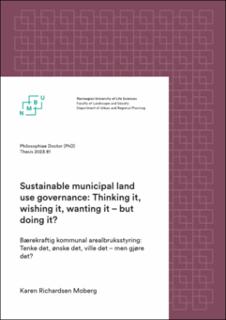Sustainable municipal land use governance : thinking it, wishing it, wanting it – but doing it?
Doctoral thesis
Published version
Permanent lenke
https://hdl.handle.net/11250/3111319Utgivelsesdato
2023Metadata
Vis full innførselSamlinger
Sammendrag
The character and direction of human societies’ development has placed us in the midst of a double crisis in nature and climate. Despite the agenda-setting of sustainable development in the late 1980s, drastic physical changes have taken place since then, continuing the escalation of the nature and climate crises at an unprecedented rate. There is a burning need to reduce the pressure on our life support system; however, human societies are yet to reverse the trend. To inform our understanding of why three decades and a half of the sustainable development agenda have not reversed the trend, this thesis explores how environmental sustainability has fared in urban development during the last three decades in four Norwegian municipalities.
The thesis studies land use governance processes in the municipalities of Sogndal, Horten, Trondheim and Malvik. It focuses on drivers, processes and changes that have affected environmental sustainability in the urban settlements and their surroundings. The thesis consists of three research articles and this synthesising chapter. The thesis asks how the persisting unsustainability of urban development in selected Norwegian municipalities can be explained, after three decades of a sustainable development agenda. The three research articles each contribute towards answering this question. The first article explores relevant driving forces, change processes, and structural conditions that has influenced the characteristics of land use changes in the case studies. The second article focuses on the driver of ideas. It analyses changes in the environmental ideas of decision-makers involved in governance processes of local spatial change, acknowledging how ideas about problems and solutions, as importantly the deeperseated ideas contribute to shaping policy outcomes. The final article investigates why the local land use governance processes in the case areas have failed to secure environmentally sustainable land use. Empirically, the thesis draws on survey questionnaires, in-depth interviews, document analysis, land use change mapping and demographic and urban structure register data to answer the research questions.
The results of the thesis show that much has improved in terms of the environmental ideas held by decision-makers, seen from a perspective of environmental sustainability. It also finds that the spatial development practices in the case areas is characterised by a more landuse efficient built environment development practice compared to the period before the 1990s. However, a main argument put forth is that the relative improvements are insufficient from an environmental sustainability perspective. Environmental goals are clearly subordinated economic goals. The results of the three articles taken together clearly indicate that the assumed need for development and growth goes largely unquestioned in processes of land use governance. Another main finding suggests that in their current form, processes of land use governance face some challenges regarding democratic performance. The land use governance processes are increasingly characterised by neoliberalism, with a strengthened position for market processes and strong economic actors. Such a turn towards strengthening market forces’ influence over land use raises serious questions regarding the consequences for democratic quality in governance processes, and the ability of the public sector to sufficiently safeguard our common resources.
The scientific contribution of this thesis to knowledge on environmental sustainability in land use governance is both empirical and theoretical. Empirically, it offers a comprehensive account of how various driving forces of land use change impact the environmental sustainability of urban development; insights into the changes in environmental ideas held by decision-makers; insights into land use governance processes in smaller urban areas at the urban/rural interface; and documentation of the role of informal processes in land use governance. Theoretically, the contribution of the thesis sits in its combination of theories from different social science disciplines, coming together to show how ideas affect structure/agency in sustainable land use governance processes, and suggestions on how planning should change in order to improve our chances of solving the crises we currently face. Karakteren og retningen til utviklingen av menneskelige samfunn har satt oss midt i en natur- og klimakrise. Til tross for at bærekraftig utvikling kom på agendaen på slutten av 1980-tallet, har drastiske fysiske endringer funnet sted siden da, og dermed fortsatt eskaleringen av natur-og klimakrisen i en uovertruffet hastighet. Det er ett brennende behov å redusere presset på systemet som støtter livsfunksjonene våre, men menneskelige samfunn har fortsatt til gode å snu trenden. For å utvide vår forståelse av hvorfor tre og et halvt tiår med bærekraftig utvikling på agendaen ikke har snudd trenden, undersøker denne avhandlingen hvordan miljømessig bærekraft har blitt håndtert i tettstedsutviklingen til fire norske kommuner i løpet av de siste tre tiårene.
Avhandlingen studerer arealbruksstyringsprosesser i Sogndal, Horten, Trondheim og Malvik. Den har fokus på drivere, prosesser og endringer som har påvirket miljømessig bærekraft i kommunenes tettsteder og deres omgivelser. Avhandlingen består av tre forskningsartikler og denne kappen. Avhandlingens spør hvordan man kan forklare at den vedvarende ikke-bærekraftige arealbruken i utvalgte norske kommuner, etter tre tiår med fokus på bærekraftig utvikling. De tre forskningsartiklene bidrar til å svare på dette spørsmålet. Den første artikkelen fokuserer på relevante drivkrefter, endringsprosesser og strukturelle forhold som har påvirket karakteristikken av arealbruksendringene i studieområdene. Den andre artikkelen fokuserer på de idémessige aspektene. Den analyserer endringene i miljøideene til beslutningstakere involvert i styringsprosesser for lokale arealbruksendringer. Den understreker hvordan ideer om problemer og løsninger, og ikke minst mer fundamentale ideer, bidrar til å forme politiske utfall. Den siste artikkelen undersøker hvorfor styringsprosessene i studieområdene ikke har klart å sikre miljømessig bærekraft. Empirisk trekker avhandlingen på spørreundersøkelser, dybdeintervjuer, dokumentanalyse, arealbruksendring-kartlegging og registerdata om demografis og bystruktur for å besvare forskningsspørsmålene.

